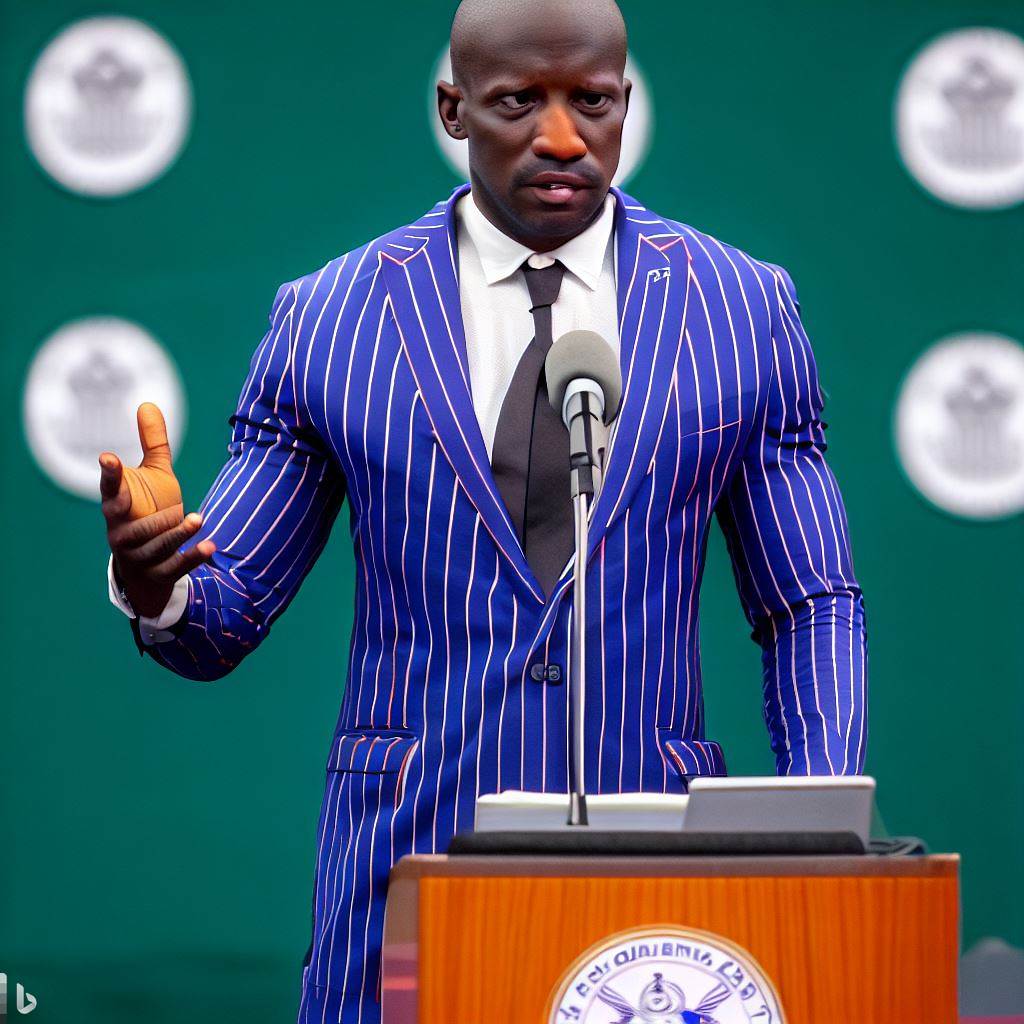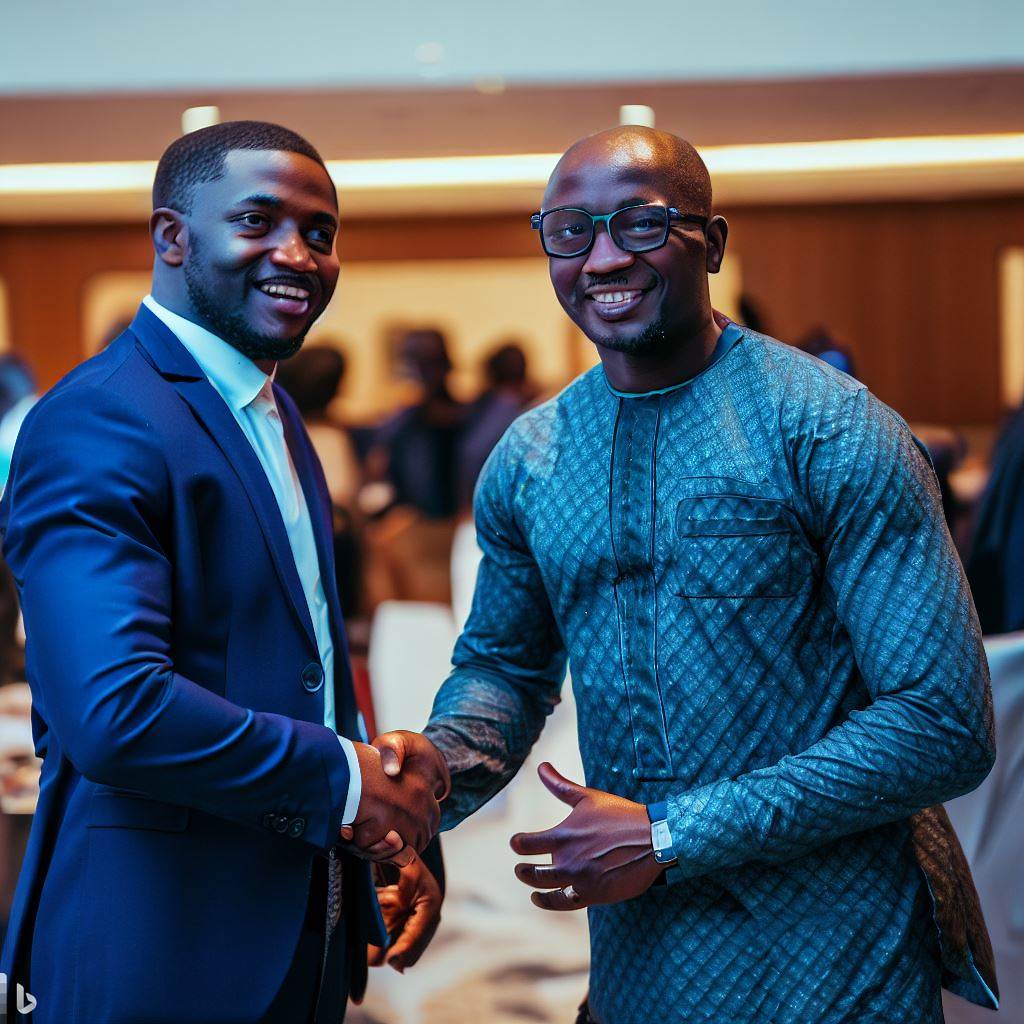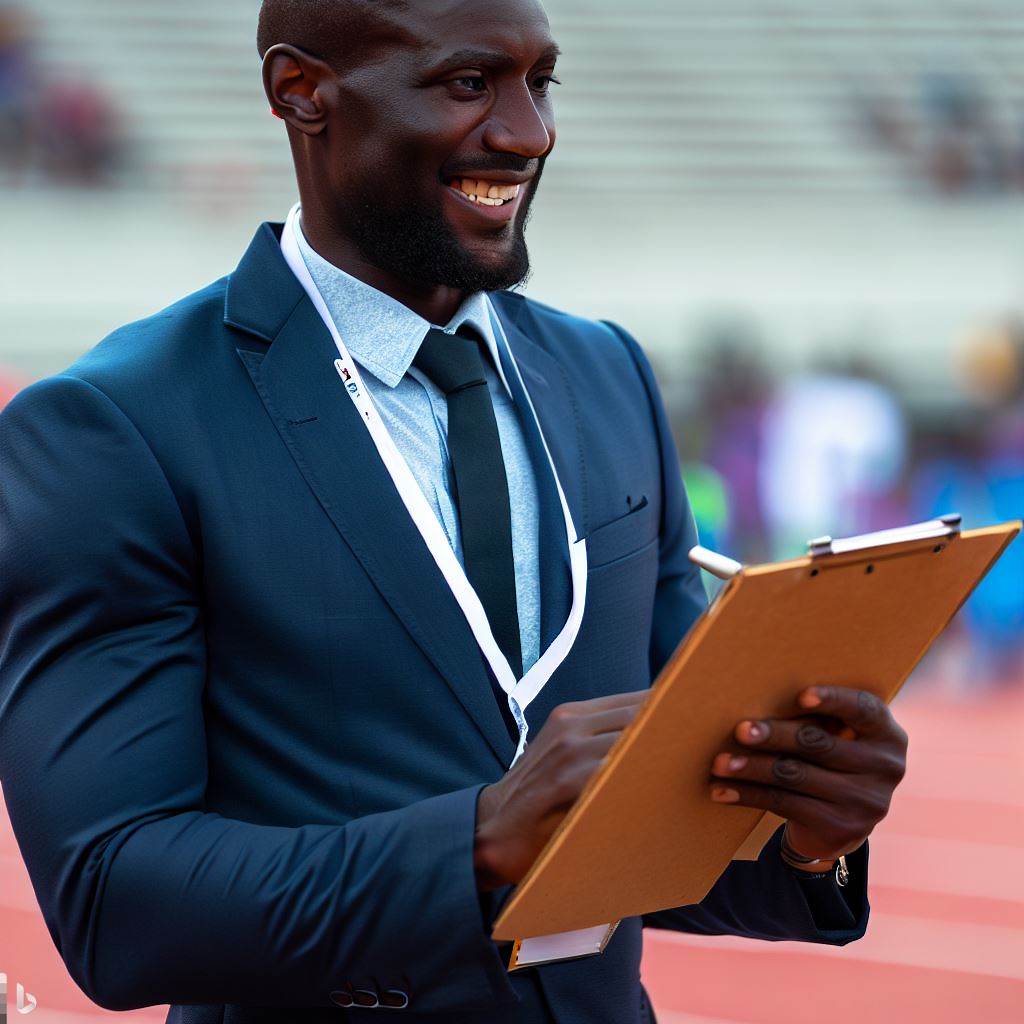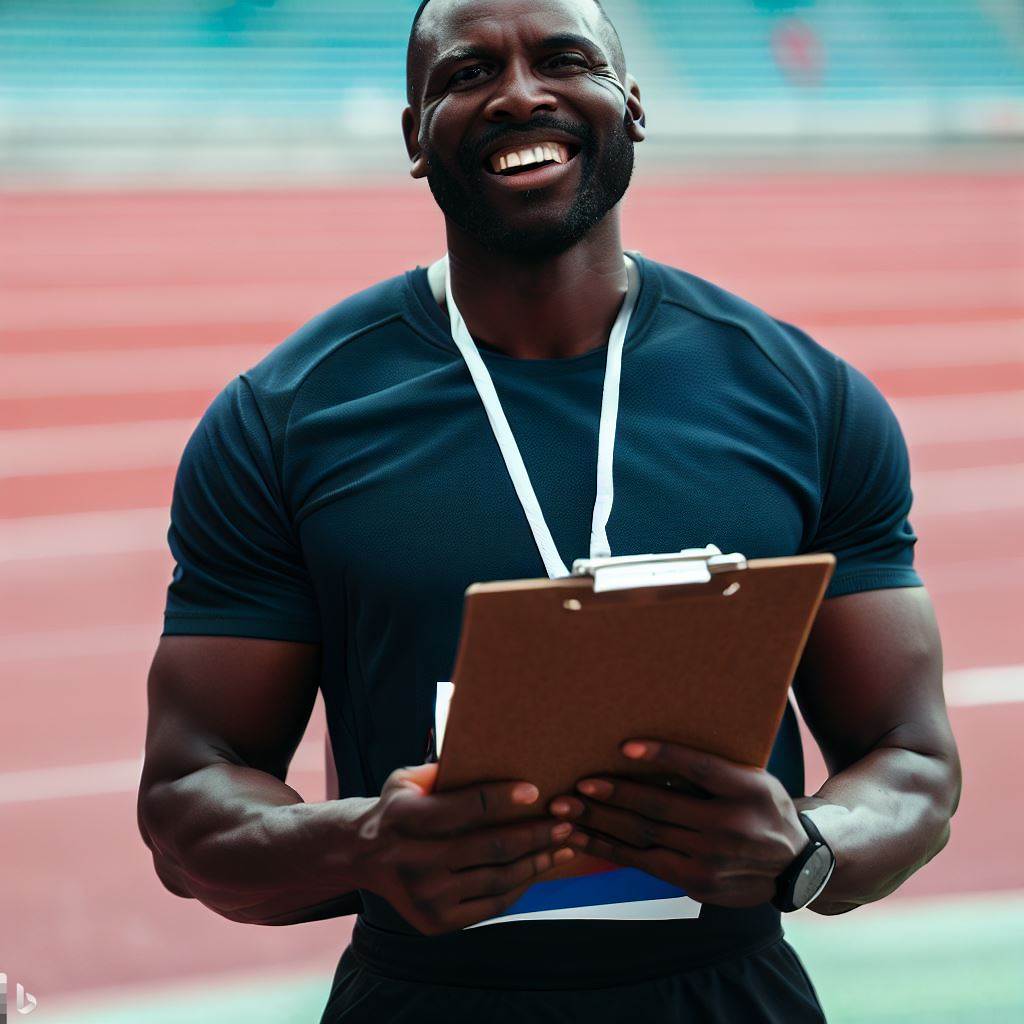Introduction
Strength coaching is a vital aspect of physical fitness training, focusing on increasing muscular strength and power.
It plays a crucial role in improving overall health and athletic performance. In Nigeria, women’s perspectives on strength coaching have evolved significantly over the years.
Initially, Nigerian women viewed strength training as a male-dominated activity and were hesitant to participate.
However, with the growing awareness of its benefits, women in Nigeria have embraced strength coaching as an essential part of their fitness journey.
This shift in perspective has been facilitated by various factors, such as the rise of female fitness role models, increased access to fitness facilities, and the recognition of women’s strength and empowerment.
Today, many Nigerian women actively engage in strength coaching, aiming to enhance their physical abilities, build confidence, and achieve their fitness goals.
Women in Nigeria now understand that strength coaching not only improves their physical appearance but also positively impacts their overall well-being.
It enhances bone density, reduces the risk of osteoporosis, and promotes body composition and metabolic health.
Furthermore, strength coaching allows women to break societal stereotypes, challenging prevailing notions of femininity.
By participating in strength coaching, women in Nigeria have the opportunity to redefine their perception of themselves and inspire others to do the same.
The subsequent sections will delve further into the benefits, challenges, and success stories of strength coaching from a women’s perspective in Nigeria.
The Significance of Strength Coaching for Women in Nigeria
A. The cultural factors and societal norms that limit women’s access to strength coaching
- Cultural factors and societal norms limiting women’s access to strength coaching
- Gender roles and expectations in Nigerian society often prioritize domestic responsibilities over physical fitness.
- Traditional beliefs regarding women’s physical capabilities discourage their involvement in strength training.
- The lack of female representation and role models in the field of strength coaching discourages women’s participation.
- Access to proper training facilities and resources for women is limited in many Nigerian communities.
- Benefits of strength training for women’s physical and mental health
- Strength training improves bone density, reducing the risk of osteoporosis and fractures in women.
- Regular strength training increases muscle mass and promotes weight management in women.
B. Why strength training is beneficial for women’s physical and mental health
Although cultural factors and societal norms may limit women’s access to strength coaching in Nigeria, the benefits of strength training for women’s physical and mental health are significant.
By challenging traditional beliefs and providing access to resources and role models, women in Nigeria can enhance their overall well-being through strength coaching.
Challenges Faced by Women in Nigeria in Accessing Strength Coaching
Women in Nigeria face numerous challenges when it comes to accessing strength coaching.
These challenges can significantly limit their ability to participate in strength training and hinder their overall fitness journey.
A. Gender Stereotypes and Cultural Biases
One of the primary challenges faced by women in Nigeria is the prevalence of gender stereotypes and cultural biases that discourage their participation in strength training.
Society often perceives strength training as a male-dominated activity, perpetuating the notion that women should focus on more “feminine” exercises or activities.
These stereotypes and biases can make it difficult for women to feel comfortable and confident in pursuing strength coaching.
B. Lack of Access to Proper Facilities and Resources
Another significant challenge is the lack of access to proper facilities and resources for strength coaching.
Many communities in Nigeria lack gyms or fitness centers equipped with suitable equipment and knowledgeable coaches who specialize in strength training.
This scarcity of resources makes it challenging for women to find appropriate spaces where they can engage in strength training safely and effectively.
C. Economic Limitations and Financial Constraints
Financial constraints pose yet another obstacle for women in Nigeria seeking strength coaching.
Many may not have the means to afford coaching services, which can be expensive, especially for individuals from low-income backgrounds.
The cost of personal trainers, gym memberships, and specialized strength training programs can be prohibitive for a significant portion of the population.
As a result, women may not have viable options to access professional guidance and support to engage in strength training.
These challenges significantly hinder the ability of women in Nigeria to engage in strength coaching and pursue their fitness goals.
However, it is essential to recognize the need for change and take proactive steps to overcome these obstacles.
Firstly, it is crucial to challenge gender stereotypes and cultural biases by promoting the benefits and inclusivity of strength training for women.
By highlighting successful female strength athletes and creating more positive narratives, we can inspire other women to defy societal expectations and embrace strength coaching.
Secondly, efforts should be made to improve access to proper facilities and resources for strength coaching.
This can involve government initiatives to build more community gyms or support existing facilities to expand their offerings.
Read: Licensing & Certification for Sports Info Directors in Nigeria
Success Stories of Women in Nigeria who have Excelled in Strength Coaching Include
Strength coaching is not just a man’s game; Nigerian women are breaking barriers and achieving remarkable success in this field.
Let’s celebrate their inspiring stories.
1. Profile of Leading Female Athletes, Weightlifters, and Bodybuilders in Nigeria
- Amaka Okonkwo: A trailblazing weightlifter, Amaka has won multiple national championships and represented Nigeria on the international stage.
- Chinyere Uche: A powerlifting sensation, Chinyere holds numerous records and has brought home gold medals from international competitions.
- Amina Ibrahim: A bodybuilder with an impressive physique, Amina has won several bodybuilding competitions and is a role model for aspiring female bodybuilders.
2. Discussing Their Achievements
These remarkable women have not only excelled in their respective sports but have also achieved groundbreaking milestones:
- Amaka Okonkwo secured a bronze medal at the Commonwealth Games, showcasing her strength and determination.
- Chinyere Uche has broken several powerlifting records, including a world record in the bench press category.
- Amina Ibrahim has triumphed in bodybuilding competitions, earning recognition for her dedication and sculpted physique.
3. Overcoming Societal Barriers
In a society where traditional gender roles often limit women’s participation in strength sports, these women have defied stereotypes:
- They’ve faced societal pressure with resilience, pursuing their passion despite discouragement.
- They’ve shattered the myth that strength sports are exclusively for men, proving that women can excel in any field they choose.
4. Positive Impact and Inspiration
The achievements of these women extend beyond personal victories:
- They’ve become inspirational figures, motivating young girls to pursue their dreams regardless of societal expectations.
- Their success stories challenge gender norms and contribute to a more inclusive sports culture in Nigeria.
Overall, these women are not just athletes; they are trailblazers, breaking down barriers and inspiring a new generation of female strength coaches in Nigeria.
Through their dedication and hard work, they have paved the way for a new generation of female athletes, weightlifters, and bodybuilders in Nigeria.
Their stories remind us that strength knows no gender, and with determination and dedication, women can achieve greatness in any field they choose.
Read: Challenges Facing Athletic Directors in Nigeria Today
Initiatives and Organizations Promoting Strength Coaching for Women in Nigeria
When it comes to promoting strength coaching for women in Nigeria, several initiatives and organizations have stepped up to empower women and improve access to strength training programs.
These efforts aim to break gender stereotypes, empower women, and promote overall well-being.
A. Identify specific programs and platforms available to women for strength coaching
- The Nigerian Women’s Strength Initiative (NWSI): This initiative focuses on providing strength coaching programs exclusively for women.
They offer personalized training plans, nutritional guidance, and support to help women achieve their fitness goals. - StrongHer Women’s Fitness Club: This organization provides a platform for women to engage in strength training.
They offer group classes, personal training sessions, and workshops focused on building strength and confidence. - Women’s Strength and Empowerment Network (WSEN): WSEN aims to empower women through strength training.
They offer online coaching, fitness challenges, and provide resources for women interested in incorporating strength training into their fitness routines.
B. Mention government initiatives or collaborations aimed at improving access to strength training for women
The Nigerian government recognizes the importance of promoting fitness and strength coaching for women and has taken several initiatives to improve access:
- The Ministry of Women Affairs collaborates with various organizations and stakeholders to provide resources and support for women interested in strength training.
- The National Sports Commission has launched programs to encourage women’s participation in strength-based sports such as powerlifting and weightlifting.
- The National Youth Service Corps (NYSC) incorporates strength coaching as part of its fitness programs for young women during their service year.
C. The role of NGOs and non-profit organizations in empowering women through strength coaching
NGOs and non-profit organizations play a crucial role in empowering women by promoting strength coaching and providing access to resources:
- Girls Empowerment Collective (GEC) focuses on empowering young girls through strength coaching.
They organize workshops, seminars, and offer scholarships for girls interested in pursuing strength training. - Women’s Health and Well-being Foundation collaborates with fitness professionals to design programs tailored to women’s fitness needs.
They conduct training sessions, provide mentorship, and create awareness about the benefits of strength training. - Beauty in Strength Initiative (BSI) aims to challenge societal norms and empower women through strength coaching.
They organize fitness challenges, provide educational resources, and celebrate women’s achievements in strength training.
Nigeria has witnessed a rise in initiatives and organizations promoting strength coaching for women.
Through specific programs, government collaborations, and the active involvement of NGOs and non-profit organizations.
More women have access to strength training and can experience the physical and mental benefits it offers.
These efforts not only empower women but also challenge gender stereotypes, promoting a more inclusive and equal society.
Read: COVID-19’s Effect on Sports Information Profession in Nigeria
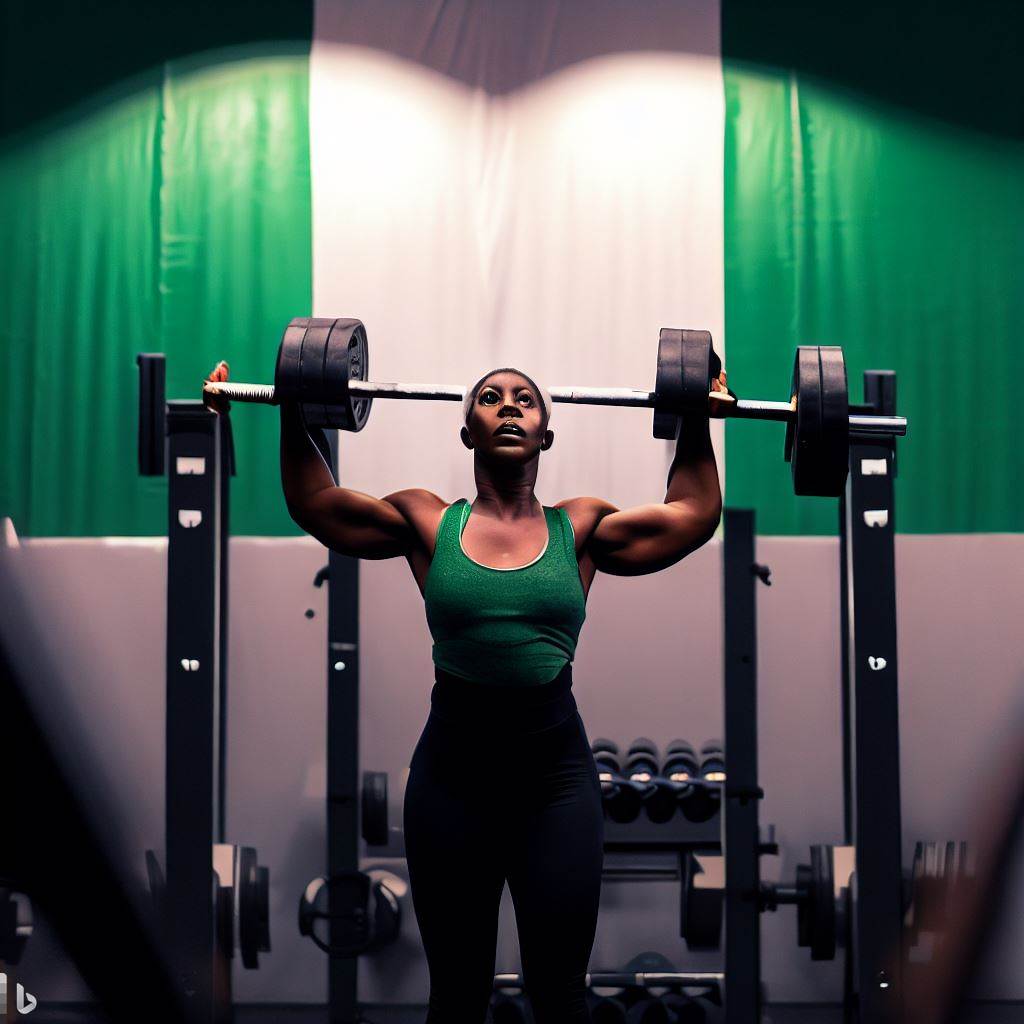
The Importance of Female Strength Coaches in Nigeria
A. The need for more female strength coaches to cater to the specific needs and preferences of women
- Women have specific needs and preferences that must be addressed by female strength coaches.
- Having women as coaches provides role models for aspiring female athletes.
- Female coaches create a safe and comfortable environment for women to train.
B. The benefits of having women as coaches
In Nigeria, there is an increasing need for more female strength coaches to cater to the specific needs and preferences of women.
Women have unique physiological and psychological requirements that can best be understood and addressed by coaches who share similar experiences.
One of the primary reasons for having female strength coaches is to create a safe and comfortable environment for women to train.
Women often face distinct challenges in male-dominated training spaces, leading to feelings of discomfort and self-consciousness.
Female coaches can help alleviate these concerns by providing an environment where women can confidently focus on their training without feeling judged or objectified.
Moreover, female strength coaches act as role models for aspiring female athletes.
Representation is crucial, and women seeing other women succeed in coaching roles can inspire them to pursue their own athletic goals.
Female coaches bring a unique perspective and personal experience that can inspire and mentor young women, breaking down barriers and encouraging them to excel in strength training.
Another benefit of having female coaches is their understanding of the specific needs and preferences of women.
Women’s bodies undergo various changes throughout their lives, and factors such as menstrual cycle, pregnancy, and menopause impact their training requirements.
Female coaches can provide guidance and adapt training programs to accommodate these physiological fluctuations, ensuring optimum performance while prioritizing women’s health.
Furthermore, female strength coaches excel in creating training programs that cater to women’s preferences.
Women may feel more comfortable discussing personal issues, such as body image concerns or self-esteem struggles, with a female coach.
This open communication allows for the development of customized training plans that align with women’s goals while addressing their unique concerns.
A diverse coaching staff also enhances the overall development of athletes by fostering a sense of inclusivity.
Women often feel more comfortable expressing themselves and seeking guidance from someone who can empathize with their experiences.
Female strength coaches establish trust and rapport with their athletes, enabling better communication, feedback, and personal growth.
Read: Starting a Career as a Sports Information Intern in Nigeria
Overcoming Barriers and Increasing Participation of Women in Strength Coaching
Women’s participation in strength coaching has historically been limited by various barriers, including societal pressures, lack of representation, and inadequate support networks.
However, through strategic initiatives and inclusive environments, we can promote women’s participation in strength coaching and empower them to embrace strength training.
A. Strategies for promoting women’s participation in strength coaching
- Provide equal opportunities: Ensure equal access to strength coaching facilities, resources, and opportunities for both genders.
- Challenge stereotypes: Challenge societal norms and stereotypes that discourage women from pursuing strength coaching.
- Promote positive role models: Showcase successful female strength coaches and athletes to inspire and motivate other women.
- Address cultural barriers: Understand and address cultural barriers that might restrict women’s involvement in strength coaching.
- Offer mentorship programs: Establish mentorship programs where experienced female coaches guide and support aspiring women coaches.
- Collaborate with educational institutions: Partner with schools and universities to introduce strength coaching programs and create awareness.
- Provide scholarships and financial support: Offer scholarships and financial assistance to encourage women to pursue strength coaching certifications and education.
- Offer flexible coaching schedules: Accommodate the needs of women with multiple responsibilities by providing flexible coaching schedules.
- Create networking opportunities: Organize events, workshops, and conferences to facilitate networking and knowledge sharing among women in strength coaching.
- Empower through education: Provide educational resources, workshops, and seminars to enhance knowledge and skills in strength coaching.
B. The importance of educational campaigns, awareness programs, and inclusive coaching environments
Educational campaigns and awareness programs play a crucial role in breaking down barriers and encouraging women to participate in strength coaching.
By highlighting the benefits and debunking myths surrounding strength training, these initiatives can increase women’s confidence and interest in the field.
Creating inclusive coaching environments where women feel supported, respected, and valued is essential.
This includes addressing gender biases, promoting equal opportunities, and fostering a sense of belonging.
C. The impact of mentorship and support networks in encouraging women to embrace strength training
Mentorship and support networks have a significant impact on women’s involvement in strength training.
Female coaches and mentors serve as role models, offering guidance, inspiration, and practical advice to aspiring women in the field.
These relationships create a sense of belonging and empowerment, helping women overcome self-doubt and societal pressures.
Support networks also provide opportunities for networking, collaboration, and knowledge sharing, ultimately contributing to increased participation and success in strength coaching.
Promoting women’s participation in strength coaching requires a multi-faceted approach.
By implementing strategies such as equal opportunities, positive role models, and educational campaigns, we can break down barriers and create inclusive environments.
Mentorship and support networks further enhance women’s involvement and encourage them to embrace the benefits of strength training.
Together, these efforts can revolutionize the field of strength coaching and empower women in Nigeria and beyond.
Conclusion
Throughout this blog section, we have explored the importance of strength coaching for women in Nigeria.
We have discussed how strength training can empower women, both physically and mentally, allowing them to break societal barriers.
By participating in strength coaching, women in Nigeria can gain confidence, independence, and a sense of accomplishment.
This form of training not only enhances physical health but also promotes mental well-being, self-esteem, and resilience.
Strength coaching provides women with the tools they need to navigate through the challenges they face in Nigerian society.
We have seen how this training helps women in Nigeria develop strength, endurance, and the ability to overcome obstacles.
It is vital to acknowledge the significance of strength coaching from a women’s perspective in Nigeria.
By embracing strength training, women can challenge gender norms, cultural beliefs, and societal expectations.
Strength coaching empowers women to assert their presence, voice, and influence in various aspects of life.
Let us encourage and motivate all women in Nigeria to explore the world of strength training.
By doing so, we can support them in breaking societal barriers and achieving their full potential.
Together, we can reshape the narrative and create a more inclusive and equal society.

